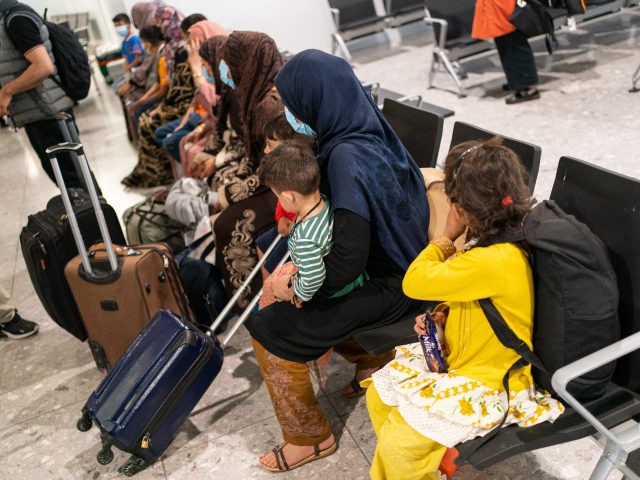The government is developing an integration scheme for Afghan migrants evacuated to the United Kingdom, which could include lessons on British culture and values, in a bid to emulate other countries with high-migrant populations like France and Germany.
The plans, reported by The Times on Friday, could see those offered refugee status given free English language training, civic duties classes, and passes to enter centres of culture like art galleries and museums.
Such measures are intended to replace the various programmes and services offered by separate government departments and local authorities, with government sources telling the newspaper that it would be employed for two of its resettlement schemes, likely referring to the Afghan Relocations and Assistance Policy (ARAP), for former employees of British authorities and their families, and the Afghan Citizens’ Resettlement Scheme (ACRS) for vulnerable Afghan civilians.
“We’re looking at how can we have an enhanced level of English-language training, how can we ensure people will get into the workplace as quickly as possible and how can we comprehensively introduce people to British culture, civic and political life, increasing people’s knowledge and understanding of the country and its values, so they can contribute fully to British life,” Communities Secretary Robert Jenrick said.
The reported plans come after the UK has already admitted 8,000 people under the ARAP scheme, such as interpreters. The figure is higher than the 5,000 initially projected, with Home Secretary Priti Patel stating last month that it could ultimately be as high as 10,000.
The separate ACRS scheme will bring in around 20,000 Afghans in the coming years — at least 5,000 by the end of 2021 — with the government stating that women, children, religious minorities, and other minorities would be prioritised for rehoming.
This week, the British government announced that ARAP refugees would be given automatic Indefinite Leave to Remain, rather than five years’ residency, giving them unrestricted rights to work in Britain and the option to apply for British citizenship in the future.
Announced under ‘Operation Warm Welcome’, ARAP refugees will also benefit from £12 million in taxpayers’ money being put into schools for extra child places, specialist teachers, and English language support. There will also be 300 undergraduate and postgraduate scholarships, £3 million for the NHS, £5 million for costs incurred by local councils, and liaison officers to help the migrants get accommodation, a GP, and other support.
The government also revealed that £200 million had been earmarked for the first year of the other civilian refugee programme, ACRS.
The Times reported on Friday that the government has offered Afghan refugees in neighbouring countries in Asia — such as Pakistan, Iran, Tajikistan, Uzbekistan, and Turkmenistan — a £30 million aid package, for those who have “left everything behind”. The British government will also make available £10 million immediately to international aid organisations, such as the United Nations High Commissioner for Refugees.
Media reported this week that the cost of supporting and housing all asylum seekers in the UK increased to £1.359 billion — a 42 per cent increase over the 2019/2020 period.
Two-thirds of councils are reportedly reluctant to be furthered burdened by housing Afghan refugees, over concerns for school places and ensuring affordable social housing for locals, which is already in shortage. The UK had also seen a record arrival of illegal aliens cross the English Channel this year already.
Sources speaking to The Times said that the government could be reversing the spending cuts on English classes for foreign language speakers.
Integration programmes on the continent include 400 hours of free language classes in France as well as 24 hours of civic training on the values of the secular Republic. The French state also gives young migrants a pass worth £400 for visiting cultural institutions like art galleries and museums. Similarly, Germany’s “pre-integration” scheme offers 600 hours of civics lessons.
After Germany admitted nearly a million Middle Eastern asylum seekers, mostly from Syria, after the 2015 migrant crisis, the German taxpayer found itself in 2018 forced to pay around €15 billion on housing and integration for migrants until 2022, including €2.44 billion for integration programmes, such as language classes. Another report from that year revealed that some 43,000 migrants were illiterate. A record-breaking €23 billion was spent on migrants in Germany in 2018 alone, 11 per cent more than the year before.
Despite social and integration programmes for migrants in Europe, a number of countries have experienced long-term integration issues. France’s migrant suburb ghettos, designated by the French government ‘Sensitive Urban Zones’, are known for suffering from high crime. France has seen an increase in underage migrant delinquency in places like Paris and Bordeaux in recent years, according to French Senator Henry Leroy.
Last month, a French think tank warned that a potential influx of Afghan migrants could lead to increased crime, with a report claiming that Afghan asylum seekers are over-represented in crime statistics compared to asylum seekers in other countries.

COMMENTS
Please let us know if you're having issues with commenting.